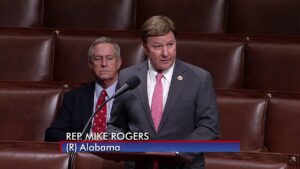The House on Wednesday officially started debate on the fiscal year 2024 National Defense Authorization Act (NDAA), adopting many non-controversial amendments while delaying consideration of many GOP-proposed measures that some Democratic lawmakers have said makes the legislation’s prospects for final passage more precarious.
The House Rules Committee reviewed over 1,500 amendments to the annual defense policy bill, with 290 of those offered on the floor Wednesday while lawmakers previewed debates ahead on the more contentious measures to be considered.

“I support the bill as it’s currently before us. The amendments that are in front of us are going to be debated one way or the other. I will still support the bill after that. As we all know, that’s not the end of the story here. There is a second rule allegedly coming. I sincerely hope that the majority prioritizes getting this bill done over the certain views of a small number of extreme measures. We’ve got a good bill. Let’s pass it. Let’s not mess it up,” Rep. Adam Smith (D-Wash.), ranking member on the House Armed Services Committee, said on the floor Wednesday.
Rep. Tom Cole (R-Okla.), chair of the House Rules Committee, acknowledged the NDAA process in the lower chamber is likely “going to go longer than we originally anticipated,” with no plan finalized yet for how to handle the remaining amendments with a second rule and proceed towards final passage.
“While we have a long road ahead of us, I’m confident that we will [pass the NDAA] again this year and I am gratified that the House is moving forward with consideration of this measure on the floor,” Cole said.
The House Armed Services Committee previously voted near unanimously on June 22 to advance its $886 billion FY ‘24 NDAA, which followed more than 12 hours of debate and its own consideration of hundreds of amendments (Defense Daily, June 22).
The 290 amendments considered on the floor Wednesday were offered on bipartisan basis or involved non-controversial provisions, with the measures adopted by voice vote in large En Bloc packages.
An amendment from Reps. Mike Carey (R-Ohio), Claudia Tenney (R-N.Y.) and Max Miller (R-Ohio) prohibits funds for the Air Force to decommission any Boeing [BA] KC-135 tankers in FY ‘24, while another would give the president authority to transfer retired “or nearly-retired” aerial refueling tankers to Israel for emergency event.
Rep. John James (R-Mich.) also led an amendment to add $30.6 million for advanced procurement of additional F-15EX aircraft, with the directive stating “these funds would support recapitalizing Air National Guard fighter aircraft with the priority given to A-10 squadrons without an identified replacement aircraft.”
An amendment adopted from Rep. Doug Lamborn (R-Colo.) directs the Pentagon to provide a strategy on increasing production capacity of the Army’s new Precision Strike Missile, built by Lockheed Martin [LMT].
Additional amendments to the NDAA approved on Wednesday include directing the Air Force to provide a future force design study for the service and Space Force through 2050, requiring DoD to submit a classified report on national security risks posed by China and Russia’s space activities and one from Rep. Mike Gallagher (R-Wis.) calling for an assessment on the “feasibility, effectiveness, and value of developing low-cost anti-ship weapons.”
The next step in the NDAA process will include working through amendments offered by conservative members, dealing with abortion-related items and the Pentagon’s policies on Diversity, Equity and Inclusion (DEI) programs, that will draw more intense debate.
“What’s happening today on the floor, not knowing when we’re coming back to finish the second rule for this bill or what offensive amendments will be included, is not just weird, it’s nuts,” Rep. Jim McGovern (D-Mass.), the top Democrat on the Rules Committee, said on the floor Wednesday. “The MAGA circus wants to load what could and should be a bipartisan bill…with every divisive social issue under the sun via the amendment process.”
Rep. Matt Gaetz (R-Fla.) urged Republican support for the NDAA, noting that many GOP-proposed measures, such as those related to service members discharged for refusing the COVID-19 vaccine and reversing Pentagon initiatives related to DEI and Critical Race Theory, were added to the bill during the HASC markup.
“I would speak now to any House conservatives who have apprehension about voting for the NDAA. If you vote against this NDAA or the rule authorizing it, you are voting to continue Critical Race Theory in our military. If you vote against the NDAA, you are voting for the continued embrace of DEI in the military,” Gaetz said.
The Senate Armed Services Committee has also approved its own $886 billion version of the bill, with Senate Majority Leader Chuck Schumer (D-N.Y.) including that he hopes to “move this quickly” in a ‘Dear Colleague’ letter sent out on Sunday evening (Defense Daily, June 23).